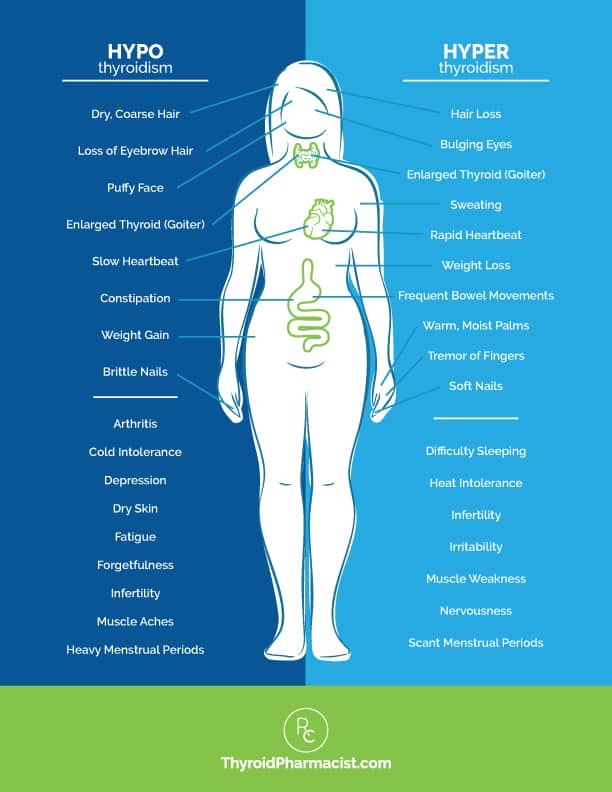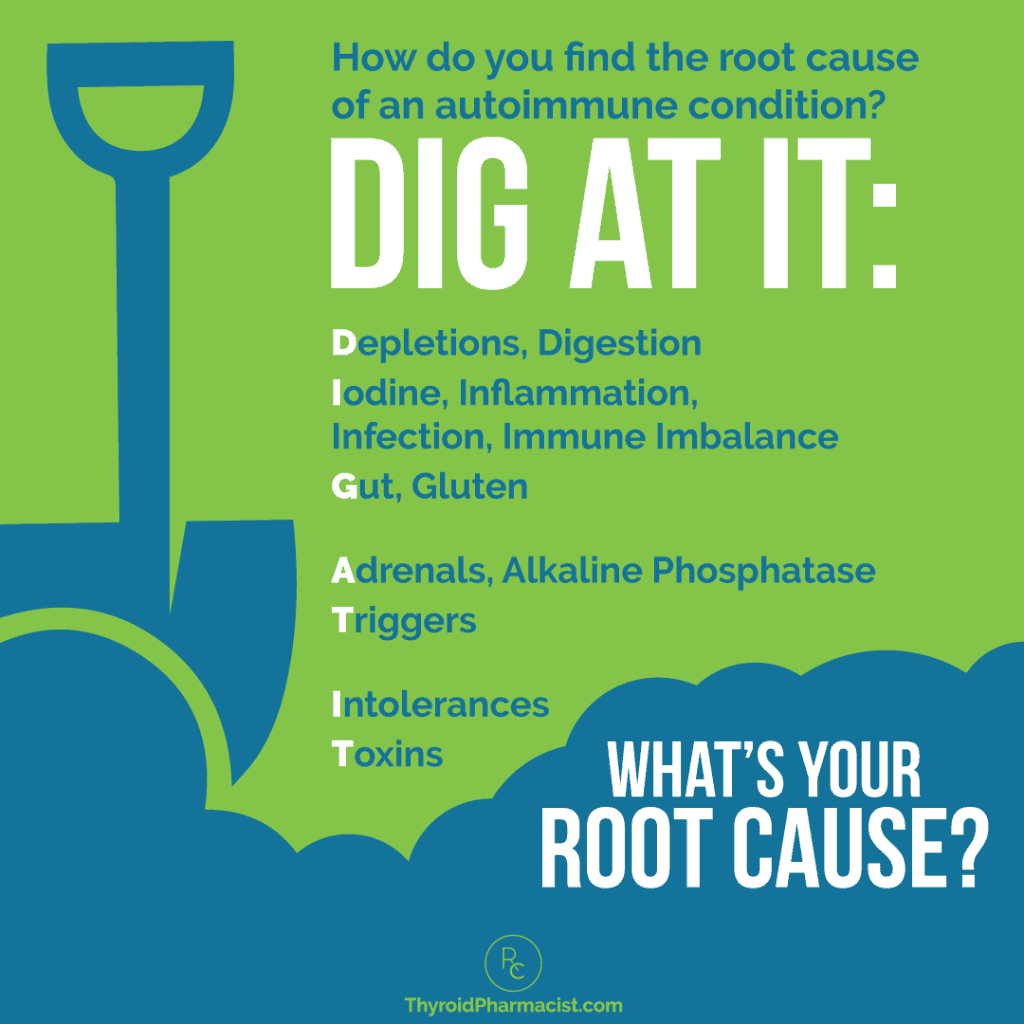Before my Hashimoto’s diagnosis, I had always been very polite, and described myself as a “diplomat.”
People knew me as someone who maintained patience and composure in almost any situation.
But for me, one of the reasons I suspected something was off with my health, was that I started experiencing mood swings in combination with starting to feel as though I was on an emotional roller coaster… yet felt numb…!
This was all completely out of character for me — but when I started addressing the root causes of my Hashimoto’s, I got better.
Some of the other symptoms I experienced early on included hair loss, exhaustion, anxiety, feeling physically cold, and brain fog. One of the main physical symptoms that alarmed me was pain and numbness in both of my arms.
For others, Hashimoto’s may mean recurrent miscarriages, an inability to lose weight, depression, fatigue, constipation, and years of frustration.
One participant in my Facebook community reported her feelings as:
“An out-of-body experience, where I don’t know who I am anymore, nor how I got this way. When I’m tired, I feel like there’s a weight on my body preventing me from moving.”
And another person shared:
“I had no energy to work any later than I had to. In summary, I missed out on life.”
I suspect my journey with Hashimoto’s, like for many of you, began many years before diagnosis.
Through my research and client work, I’ve learned that almost everyone feels emotional changes along with physical symptoms associated with thyroid disease.
Knowing that many others experience the emotional roller coaster that comes with Hashimoto’s, I wanted to write an article that describes what it feels like to have thyroid disease.
In this article, I’ll share:
- My experience with Hashimoto’s
- Other experiences of people with thyroid disease
- How to receive emotional support on your health journey
- Where to start with Hashimoto’s
How Hashimoto’s Can Affect Emotions
To me, the scariest experience after my thyroid diagnosis and starting to take thyroid medication, was the dissociation from myself. I became numb and apathetic to life, unable to feel any emotion, good or bad. I no longer had a desire for the things that made me human, such as being close to others, making friendships, following my passions, and loving the people in my life. It was as though my inner “love” switch was turned off or dimmed and I was living in a cold, dark world… and all but a very small part of me didn’t care.
Like the Pink Floyd song, I had become comfortably numb.
People who have thyroid disease can experience a myriad of emotional and physical symptoms.
Aside from the stress that they may feel, there’s plenty of evidence showing that thyroid disease and Hashimoto’s are also positively correlated to higher rates of anxiety, depression, and alexithymia (an inability to describe emotions). (1-6)
Here are some examples of the findings:
- Most people with Hashimoto’s reported feeling drained, even though, when tested, their thyroid hormones were within a range considered “normal” and healthy. (7)
- Some had an altered sense of time; others felt like “observers watching the world pass.” (8)
- Often, they would blame themselves for their lack of energy, feeling guilty and telling themselves to “pull it together.” (8)
- People with Hashimoto’s may feel a lack of control over their bodies. One person commented: “We used to be able to control our bodies, but now, our bodies have begun controlling us. Mind over matter seems much more difficult.” (8)
- On the other hand, people with hyperthyroidism felt like they had a restless mind and a loss of emotional control. They felt like their intention was separated from their mind, and that they could not control their feelings of impatience, anger, and irritability, which then led to involuntary and out-of-proportion emotional outbursts! (9)
These studies shed light on the patient experience. Many people with Hashimoto’s will still experience struggles like those listed above, even while taking thyroid medications – I know I did! The severity of symptoms can vary considerably. Some don’t have any symptoms, while others have physical and emotional symptoms.
Years ago, I asked my Facebook community of Root Cause Rebels what it feels like to live with Hashimoto’s, or how living with Hashimoto’s affects them — here are some of the responses (some are edited for clarity):*
“Confusing, exasperating, numbing, exhausting. It’s so incredibly hard on those that have it, as it is hard on those that love us. It’s hard to explain the feelings, the desperation, the weight gain, and the lack of intimacy, to those that have not experienced it first hand, it’s just hard.”
“Sleeping in thick socks and a sweater because even if I have the AC set to 70 degrees in my house at night, I feel it’s 40 degrees.”
“Like you don’t recognize yourself… you keep trying to find the old ‘me,’ but she’s long gone. I miss the girl I was before Hashimoto’s.”
“I feel like a completely different person… What is worse is no one gets it, your friends, family, doctors. Kind of breaks the spirit.”
“I’ve spent 8 years being treated for debilitating headaches and fatigue, and all throughout those years, I missed out on life. I missed seeing my oldest play in her last state basketball game. I missed the last 6 years of driving my kids to school. I missed out on going to lunch with friends and ate at my desk because I had no energy to work any later than I had to. In summary, I missed out on life. I ended up burning out and quit the job I loved because I just couldn’t get up anymore/work at day/headache at night. Took all kinds of preventative meds, which took care of the pain but not the other symptoms, all to find out that I had Hashimoto’s and by treating that and adrenal fatigue, I didn’t need to take the anti-seizure/antidepressant meds (the preventatives). I had memory problems when I used to have a slightly photographic memory. All because my general physician based his diagnosis on TSH, which is still low but normal, even though I don’t spit out any T4/T3 and my antibodies are off the chart.”
“Husband: ‘I figured out why the tub is backed up!’ as he holds up a huge wad of my hair. Again.” (Hair loss)
“Walking against the current of a raging river, on a good day.” (Fatigue)
“Like piranhas are gnawing on every joint of your body.” (Joint pain)
“Like you are standing in a dense fog, not knowing where to go.” (Brain fog/short-term memory loss)
“An out-of-body experience… when I’m tired, I feel like there’s a weight on my body preventing me from moving.”
“Like wading through chin-deep mud or quicksand with a load of bricks on your back, the day after the most grueling workout imaginable, after pulling several all-nighters in a row. Sometimes hungover on top of that, except without the fun part. You think ‘if I could only rest for 5 minutes’ and wake up 13 hours later.” (Fatigue)
As you can see, one person’s Hashimoto’s is not the same as another person’s Hashimoto’s! If you’ve been feeling anything similar to what’s described above, or even something different, know that you’re not alone.
Common Symptoms in Hashimoto’s
People with Hashimoto’s may experience symptoms of both hyper- and hypothyroidism — the symptoms themselves as well as the severity of symptoms can shift over time, which is why Hashimoto’s can have so many different faces.
This is part of why it’s so important to get the right set of tests. I also recommend keeping track of your symptoms using a health app or journal.
The most common symptoms in Hashimoto’s are: (10)

Often in the early stages of Hashimoto’s, a person may swing into a hyperthyroid state, or symptoms may even be considered subclinical. For those with Hashimoto’s, as the thyroid is destroyed, stored hormones can be released, causing sudden high levels of thyroid hormone. Then, as that is depleted and the thyroid becomes further damaged, thyroid levels can become low, with hypothyroidism redeveloping. (11)
It is also possible to have Hashimoto’s and have a single thyrotoxic nodule (this means it produces too much thyroid hormone), which results in hypo- and hyperthyroid swings. (12)
Symptoms may also vary as they are related to different systems such as the liver, the gut, and the adrenals.
Even when TSH levels appear to be in a normal range, elevated thyroid antibodies can contribute to symptoms such as pain, anxiety, distress, fatigue, weight gain, and depression. (13)
Furthermore, many of us don’t fully understand the impact of our condition, because the non-specific symptoms of autoimmune thyroid disease are often brushed off as being part of everyday life…
I wish I could tell you that most people with thyroid disease see a disappearance of their symptoms as soon as their thyroid hormones are addressed with medications.
Unfortunately, this is not always the case. Some people may continue to have a persistent reduction in their health-related quality of life, even while taking thyroid medications. This is why I am so passionate about taking charge of your own health and recommend a root cause approach to Hashimoto’s.
In conventional medicine, there is still very little awareness about all of the implications of how Hashimoto’s can make us feel. This may be one of the reasons why it may be difficult for loved ones and other people in our lives to understand what we’re going through.
Why Hashimoto’s May Be Difficult for Others to Understand
Looking back at my thyroid journey, I can see times when I was clearly on a hyperthyroid-induced emotional roller coaster.
One night, I found myself “wearing my heart on my sleeve.” My husband and I got into an argument before meeting friends for dinner, and I spent the entire evening sulking and sobbing, making our friends super uncomfortable. Normally, I would have put on a big smile and pretended like everything was fine.
Another time, when I started taking thyroid medications but was overdosed, I was driving with my mom in the car and following her directions. She wasn’t paying attention and forgot to have me turn somewhere, then tried to tell me to turn suddenly.
I got so mad that I started yelling at her and speeding! This was completely out of character for me. My poor mom was shocked and held onto her seatbelt for dear life! I completely blew the situation out of proportion. It was like I had no fuse! So what if we missed a turn? We were going on a leisurely shopping trip and had the whole day ahead of us… Of course, I felt horrible and embarrassed for treating my mom this way. (Sorry, Mom!)
Outbursts are just one of the many possible “side effects” of a thyroid condition.
When we have an invisible illness, some of us have found it difficult to validate the effects of our illness, because our symptoms are virtually invisible to others.
We might try to pretend that there’s nothing wrong with us.
But because autoimmunity is a silent disease, our friends and family might see us looking just as good as we normally would, and not realize we need help and support.
They don’t realize we feel sick or are just struggling to get by.
Sometimes we need to see our lab tests to understand how “sick” we are. I remember one client telling me it took seeing a TSH test result of 100 IU/mL and a trip to the doctor to admit that she was exhausted. (A TSH reading of 100 IU/mL is extremely high; the American College of Clinical Endocrinologists recommends that TSH levels be between 0.3 and 3.0 μIU/mL, and I recommend an even narrower optional range of 1 to 2 μIU/mL for adults.)
For many of us, even the lab tests don’t tell the whole story, since “normal levels” of thyroid hormones in labs are not the same as optimal levels that help us feel our best (learn more about different tests and optimal levels in this article).
It doesn’t help the situation that most of us are brushed off by doctors and loved ones. The lack of obvious “physical” features with Hashimoto’s often makes it difficult for loved ones, as well as patients themselves, to understand the deeper impact Hashimoto’s can have on our minds, bodies, and souls.
A person who is sniffling, coughing, and has a fever is expected to sleep all day, but a person who has hypothyroidism, “an invisible disease,” often feels unjustified for wanting to sleep all day, and others may not understand that fatigue is indeed a symptom of thyroid issues.
What We Often Hear…
Significant others, friends, colleagues, and family members often do not acknowledge or understand the effect the condition has on their loved one’s daily functioning.
I remember trying to tell my husband how awful and tired I felt when I was first diagnosed, and all he could say was, “I think it’s in your head. You look just fine to me.” Family members told me that if I just tried a little harder, woke up earlier, and stopped feeling sorry for myself, all would be well.
Have you ever heard one or more of the following?
- “It’s all in your head.”
- “You don’t look sick!”
- “You’re just stressed.”
- “You’re just getting older.”
- “Everyone’s tired.”
- “You must be depressed.”
- “You’re eating too much.”
- “You’re not trying hard enough.”
You may also hear, “I know another person with thyroid disease, and they function just fine. Why can’t you be more like them?” But they do not realize that because the symptoms of Hashimoto’s are so variable, two individuals with Hashimoto’s may have a completely different experience!
While I experienced fatigue and mood imbalances, another individual’s experience may be more focused on weight gain and cold intolerance. This variability makes it difficult for some to understand or empathize, as someone with Hashimoto’s could “look” completely different than what is expected for those with autoimmune conditions.
What We Long to Hear from Loved Ones
Whenever I’ve had minor surgeries, like a wisdom tooth extraction that left me with chipmunk cheeks, or a deviated septum surgery that left me with a bandage on my nose, everyone felt bad for me!
My family and friends went out of their way to take care of me, encouraged me to rest, and made special food for me. Of course, the irony was that the pain from the surgeries was negligible compared to the pain I felt from Hashimoto’s.
The difference? Those around me saw those bandages and chipmunk cheeks as “proof” of pain.
Those with Hashimoto’s long to have the same support with autoimmune condition experience as they do with “visible” injuries or illnesses.
When others express real empathy and compassion, even if they cannot fully see or understand what people with Hashimoto’s are going through, it can make an incredible difference in the healing journey.
Some people with Hashimoto’s will try to act like superheroes and minimize their symptoms while hurting inside; others may exaggerate symptoms to gain some sympathy from their loved ones. Either way, I believe that most people long for acknowledgement from friends and loved ones.
For me, when I was deep in it, admitting to my symptoms felt like defeat and self-pity; a part of me was ashamed of the feelings I had. But I can tell you that self-care and self-compassion are a big part of healing, and that is what ultimately brought me out of the dark, cold, secret place I once found myself.
It’s okay to admit that you don’t have everything figured out and that you’re not the superman or superwoman you are pretending to be! It’s okay to let loved ones know that you are going to need their support and understanding during this time.
And it’s understandable if you are afraid that you will feel like this forever — but please believe me when I say you won’t.
How to Ask for Support from Our Loved Ones
As you know by now, Hashimoto’s is an “invisible illness.” This means your loved one may look at you the same way they always have, thinking that there’s nothing ”wrong” with you.
Meanwhile, here you are struggling with heavy symptoms like fatigue, anxiety, mood swings, pain, and depression!
Here are some simple ways you can ask for support:
- Ask them to listen without judgment
- Make sure that they validate your experience
- Suggest meals that are compliant with your diet
- Ask if they can take care of a chore you might be too tired to do
- Let them know that you need to rest when possible
- Plan low-key activities for when you spend time together… probably no 10-mile hikes, but some yoga, sauna, or swimming time could be perfect!
Let them know that these kinds of small actions can mean the world to someone who’s struggling with Hashimoto’s.
For more support, there’s a wonderful Facebook Group specifically devoted to Hashimoto’s Support For Spouses & Family, that they may wish to join as well.
You Can Get Better!
Today, I encourage you to connect with what you’re going through, and show yourself the same compassion you would show to a child or pet going through a difficult time.
The first step in overcoming any challenge, health-related or otherwise, is to acknowledge and accept that Hashimoto’s is a reality in your life.
Learning to accept myself “as is” and letting go of wanting to be “perfect” were important parts of my healing journey. My book, Hashimoto’s Thyroiditis: The Root Cause, is a testament of my own self-acceptance.
Writing that book was certainly healing for me and allowed space for me to self-reflect and accept what I was going through.
I recommend that you do an honest inventory of what you’re going through, and give yourself permission to show yourself some serious love and compassion.
This is a crucial step to awakening to the clarity of where you are in your health journey and where to go next.
Here are three questions to guide you towards acceptance and help you have honest conversations with yourself and loved ones:
- Be honest: How does thyroid disease make you feel? Consider journaling your feelings.
- What are some things you could do to show yourself more compassion?
- How can you ask for and find support from people who truly understand what you are going through?
The next few steps consist of having a strong support system — this can include connecting with other individuals who have Hashimoto’s, finding the right healthcare practitioner who truly understands Hashimoto’s, or simply having your loved ones better understand what you are going through.
I can’t stress the importance of having a sense of community, support, and simply a person to talk to when going through your life, and especially through your health journey.
Simply expressing how you feel to a person or group who truly “gets it” can go a long way towards acceptance and feeling more positive about Hashimoto’s, and our whole lives.
And a positive side effect of feeling this way is that we can feel more empowered to share what’s really going on with our loved ones.
Recommendations for Support with Your Hashimoto’s Journey
If you are interested in finding or cultivating a support system for Hashimoto’s beyond your circle of friends and loved ones, here are my recommendations:
Find a Hashimoto’s Support Group
Finding a support group of individuals who are going through a similar journey can be an incredibly validating experience. Because Hashimoto’s shows up as an invisible illness, sometimes those who look “fine” but are feeling the effects of this condition, make us feel most heard.
I recommend searching for support groups on Facebook — here is one example, the Hashimoto’s Thyroiditis Support Group — as well as searching for online wellness communities that do (virtual or in-person) meetups.
If you have not joined us already, consider following my Thyroid Pharmacist Facebook Page! It’s a place where I share daily tips and inspiration, AND where you can get a bit of guidance on the next steps of your journey from me and other community members.
I try to check in regularly to answer questions, and occasionally pop in for a Facebook chat to connect with everyone!
I’m proud to say that we are now over 400,000 members strong, and I love seeing comments from community members who have taken back their health after discovering new information.
Different communities will have a different atmosphere or tone — I recommend joining a community that makes you feel heard and brings out those feel-good endorphins.
Search for Dr. Right
Having a supportive healthcare provider can make all the difference on your health journey. You want to work with someone who supports you, who treats you like you’re more than just a number, and who understands that the condition of your thyroid cannot be summed up by lab results alone. Your symptoms are real and it’s important that your healthcare provider is committed to your well-being, so you can get back to feeling your best!
Finding a dedicated practitioner who understands the root cause approach is crucial for long-term improvement (and remission) of Hashimoto’s. Many do not know where to start searching for Dr. Right, and some have had not-so-great experiences with practitioners that make them hesitant to try a new doctor. As such, I developed a database of recommended practitioners…
You may also want to consider adding more professionals to build a supportive care team — for instance, a therapist, holistic dentist, and/or naturopath.
Share Hashimoto’s Knowledge with Your Loved Ones
Sharing your knowledge of your condition, with loved ones, can also be helpful. You could:
Sharing this article with your loved ones can help them understand the “invisible” side of this illness. Others may have a difficult time visualizing how mood swings can affect those with Hashimoto’s, or how flare-ups can prevent many from completing daily tasks with ease. As your loved ones read the experiences shared in this article, they may gain some insight, and the next section specifically shares some ways for them to support you.
Where to Start With Healing Hashimoto’s
Being a Root Cause Rebel, when I was diagnosed with Hashimoto’s, I was curious to learn more about how Hashimoto’s develops and what effective long-term solutions for this autoimmune condition are.
Getting on the right medication is definitely an important first step… but what happens after that?
What diet is right for you? Should you do a liver cleanse? Balance your adrenals?
Hashimoto’s is complex, and in my experience, some people with Hashimoto’s need to focus on many layers of healing in order to discover how much better they really can feel!
Conventional medicine tends to look at each symptom as separate, and tends to focus only on thyroid hormones directly. But functional practitioners look at the big picture, and consider all the moving pieces that could be triggers for Hashimoto’s.
Through working to get my own Hashimoto’s under control, I developed the “DIG AT IT” approach. Each letter represents a different area that should be addressed to uncover your root causes.
The acronym stands for:

I know this can sound overwhelming! That’s why I suggest that you start with “cutting down and trimming branches” to remove the obvious triggers and make the simplest modifications. Then later, you can work to repair the other broken systems.
If you’re curious to learn more about Hashimoto’s, I encourage you to read the following articles:
No matter where you start, just know that there are people out there who have found their root cause and are living their best lives… and you can too!
I hope that you show this article and your reflections to your loved ones, so that they too can get a glimpse of what you’re going through.
My hope is that they will be able to see past the invisible illness, the superhero mask you’re wearing, and your struggles, and give you the support, acknowledgment, and validation that you deserve.
If you’re like me, you probably had placed high hopes on thyroid medications after your diagnosis, only to be disappointed that they only helped a few things, while you were left with dozens of residual symptoms. This is because there’s much more to autoimmune thyroid disease than just thyroid hormone levels.
I truly believe that we need to take a whole-person approach to become our best selves again.
And right now, even if you feel like you will never get better, I want to let you know that you can get your life back. I’ve done it, and thousands of my clients and readers have, too.
My life’s work is dedicated to sharing success stories and strategies for health recovery so that more success stories and strategies can be created and uncovered.
For future updates, make sure to follow us on Facebook and Instagram!
P.S. You can also download a free Thyroid Diet Guide, 10 thyroid-friendly recipes, and the Nutrient Depletions and Digestion chapter of my first book for free, by signing up for our newsletter. You will also receive occasional updates about new research, resources, giveaways, and helpful information.
References
- Siegmann EM, Müller HHO, Luecke C, Philipsen A, Kornhuber J, Grömer TW. Association of Depression and Anxiety Disorders With Autoimmune Thyroiditis: A Systematic Review and Meta-analysis [published correction appears in JAMA Psychiatry. 2019 Jun 19;:]. JAMA Psychiatry. 2018;75(6):577-584. doi:10.1001/jamapsychiatry.2018.0190
- Gorkhali, Binu et al. Anxiety and Depression among Patients with Thyroid Function Disorders. J Nepal Health Res Counc. 2020 Nov 13;18(3):373-378.
- Ayhan, Medine Giynas et al. The prevalence of depression and anxiety disorders in patients with euthyroid Hashimoto’s thyroiditis: a comparative study. Gen Hosp Psychiatry. Jan-Feb 2014;36(1):95-8.
- Martino, Gabriella et al. Alexithymia, Emotional Distress, and Perceived Quality of Life in Patients With Hashimoto’s Thyroiditis. Front Psychol. 2021; 12: 667237.
- Giynas Ayhan M, Uguz F, Askin R, Gonen M. The prevalence of depression and anxiety disorders in patients with euthyroid Hashimoto’s thyroiditis: a comparative study. General Hospital Psychiatry. 2014;36(1):95-98.
- Yalcin MM, Altinova AE, Cavnar B, et al. Is thyroid autoimmunity itself associated with psychological well-being in euthyroid Hashimoto’s thyroiditis?. Endocr J. 2017;64(4):425-429. doi:10.1507/endocrj.EJ16-0418
- Groenewegen KL, Mooij CF, van Trotsenburg ASP. Persisting symptoms in patients with Hashimoto’s disease despite normal thyroid hormone levels: Does thyroid autoimmunity play a role? A systematic review. J Transl Autoimmun. 2021;4:100101. Published 2021 Apr 15. doi:10.1016/j.jtauto.2021.100101
- Nexø MA, Watt T, Cleal B, et al. Exploring the experiences of people with hypo- and hyperthyroidism. Qual Health Res. 2015;25(7):945-953. doi:10.1177/1049732314554093
- Marian G, Nica EA, Ionescu BE, Ghinea D. Hyperthyroidism–cause of depression and psychosis: a case report. J Med Life. 2009;2(4):440-442.
- Ragusa F, Fallahi P, Elia G, et al. Hashimotos’ thyroiditis: Epidemiology, pathogenesis, clinic and therapy. Best Pract Res Clin Endocrinol Metab. 2019;33(6):101367. doi:10.1016/j.beem.2019.101367
- Mincer DL, Jialal I. Hashimoto Thyroiditis. In: StatPearls. Treasure Island (FL): StatPearls Publishing; June 21, 2022.
- Thyroid Nodules. American Thyroid Association. Accessed September 2, 2022. https://www.thyroid.org/thyroid-nodules/
- Carta MG, Loviselli A, Hardoy MC, et al. The link between thyroid autoimmunity (antithyroid peroxidase autoantibodies) with anxiety and mood disorders in the community: a field of interest for public health in the future. BMC Psychiatry. 2004;4:25. Published 2004 Aug 18. doi:10.1186/1471-244X-4-25
Note: Originally published in August 2016, this article has been revised and updated for accuracy and thoroughness.


